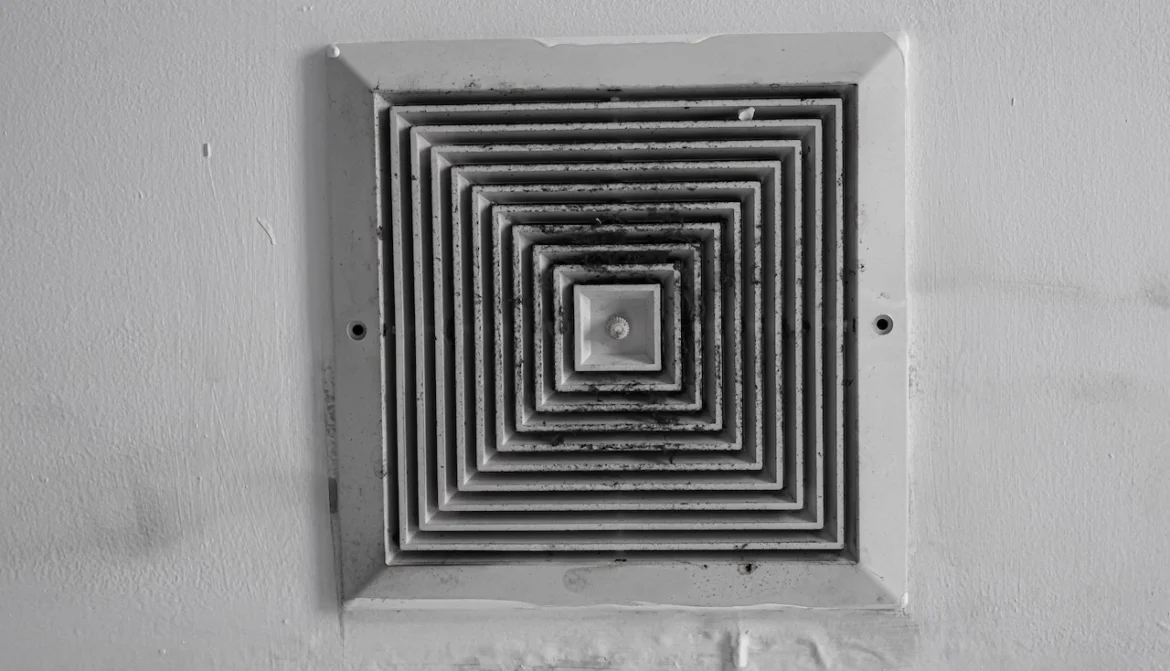If your A/C has ever turned on and blown out a damp, stale or musty smell, or you’ve seen rust spots and discoloration around your air vents, mold is likely the culprit.
We often hear from Florida homeowners who wonder if mold can be a problem within HVAC units.
And yes, moldy HVAC systems aren’t just a possibility, it’s actually one of the more common mold issues in homes here.
Question: What happens when you leave a glass of ice water out in a warm room? Answer: The same thing that happens in an A/C unit when cold air comes into contact with hot air. As air comes into contact with either the ice cold glass, or the cold fins of your A/C’s blower wheel, that air is cooled to below the room’s dew point, and condensation forms.
The key fact to keep in mind here is that it isn’t water from inside the glass forming on the outside of it—it’s water vapor that was already in the air suddenly cooling and reaching dew point.
That water vapor was already in the room. Not a bad thing as we need moisture to survive, but so does mold.
And when too much water vapor exists in a room (which we call humidity), mold has enough moisture to grow.
Why Mold Grows in HVAC Systems
Florida’s humid climate creates ideal conditions for mold growth—especially in cool, damp areas like your HVAC system.
Inside your air ducts and air handler, condensation builds up. And if that moisture isn’t drained or dried properly, mold spores can settle inside the A/C and start growing.
This is one of the most common mold problems we see in Florida homes.
And since your A/C system is the “lungs” of your home, that creates problems for your house and your family.
Signs of Mold in Your Air Conditioning System
If mold was a problem in your A/C system, you would see symptoms like these:
- Musty or mildew-like odors when the system is running
- Visible mold growth or dark spots and rust around air vents or near the air handler
- Increased allergy symptoms or respiratory discomfort while you’re indoors. Allergies that get worse at home and clear up while you’re away are usually a sure sign of mold at home.
- Excess condensation or standing water near your HVAC unit
- Persistent headaches, mental fog, or fatigue that gradually improves when away from home.
If you’re noticing one or more of these symptoms, it’s well worth having your A/C looked at for a potential mold problem. It’s not always the A/C, but it very often is a mold problem somewhere in the house.
What to Do If You Think Your Home has HVAC Mold
If you believe there might be mold growth in your A/C, you can do some simple checks to help determine whether it’s an actual problem:
- Smell test: Stand near your air vents when the system is on. If there’s an earthy, musty smell, mold could be a problem. Breathing in mold isn’t good, so do this quickly.
- Visual inspection: With a flashlight, take a look inside a vent or around your air handler. Dark spots (often black or green), or white fuzzy patches are likely mold.
- Check the drain line: A clogged drain line can cause water buildup, which promotes mold growth. Standing water near the A/C unit would be a concern.
What to Avoid
- Don’t use bleach or household sprays to clean suspected mold. These can stir up mold spores, and they often only worsen the problem.
- Don’t ignore the problem. Mold can spread quickly and can compromise your indoor air quality and the health of your family. Often one person at home (usually a female) will suspect mold or mildew, because they’re more sensitive to it. Given enough mold and enough time, everyone will react or respond in some way to it. These early warners are the “Canaries in the coal mine,” and you should listen to them.
When to Contact Professionals
If you’ve seen mold or are experiencing symptoms like respiratory irritation or mental fog, it’s time to call in licensed professionals.
In Florida, mold is handled by one type of licensed contractor, and A/Cs are handled by another licensed contractor, but at Mold Solutions, we’ve partnered with the best so that our approach isn’t limited.
At Mold Solutions, we provide free and comprehensive environmental consultations, and thorough mold remediation services, including in HVAC systems.
We also partner with trusted local HVAC professionals to resolve any underlying moisture or ventilation issues, helping to ensure the problem doesn’t return.
Tips to Prevent Mold Growth in Your HVAC System
- Change filters every 1-2 months, especially in Florida’s humid climate.
- Schedule annual HVAC maintenance and cleaning.
- Consider installing a UV light or whole-home dehumidifier.
- Address any leaks or drainage issues quickly.
Your HVAC System is Your Home’s “Lungs”
Think of your HVAC system as the lungs of your home.
Keeping it clean and mold-free is crucial to maintaining a healthy living environment.
If you suspect mold, don’t hesitate to have it professionally evaluated.
For inspections, remediation, or expert advice, visit moldsolutions.com or give us a call at (727) 276-4787. We service the entire Tampa Bay area.







